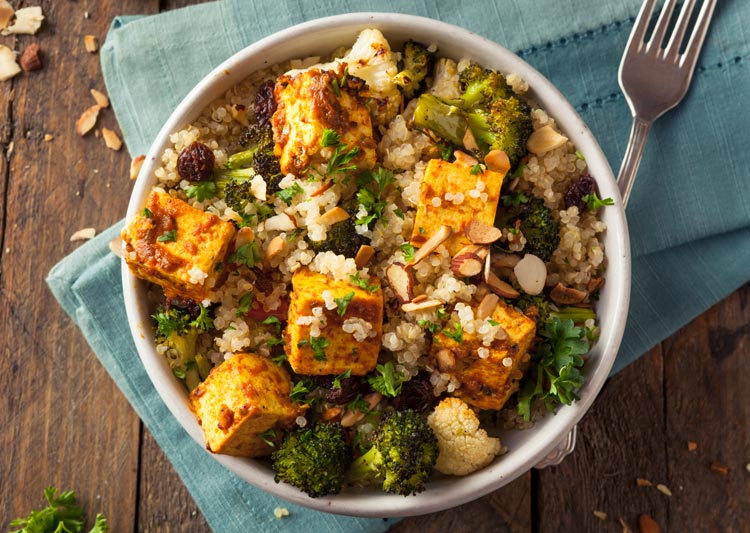Cravings Are Normal
 Experiencing cravings for drugs or alcohol is a normal part of the addiction recovery process. It’s nothing to be ashamed of, although the experience can be uncomfortable.
Experiencing cravings for drugs or alcohol is a normal part of the addiction recovery process. It’s nothing to be ashamed of, although the experience can be uncomfortable.
In most cases, cravings pass on their own within 10 to 15 minutes. However, you can help limit your cravings by tweaking your diet to provide your body with the fuel it needs to heal the damage caused by substance abuse.
Planning Your Diet to Help You Gain Control of Your Cravings
Although everyone’s recovery experience is a little different, experts agree that increasing your intake of certain nutrients can be helpful in gaining control of your cravings. Diet tweaks to consider include:
- Protein helps slowly stabilize the production of dopamine in the body when you’re in the early stages of recovery. Sources of protein to add to your diet can be found in red meat, pork, chicken, fish, dairy products, and eggs. Chickpeas, black beans, split peas, walnuts, almonds, nut butters, and tofu are good sources of protein for people who don’t eat animal products.
- Complex carbohydrates such as those found in whole grain breads and cereals help control cravings by increasing feelings of fullness and keeping blood sugar stable.
- Increasing your intake of calcium can help with symptoms of chronic pain and inflammation, which is particularly helpful for people suffering from opioid addiction. Calcium can be found in dairy products as well as fortified cereals and dark leafy greens like kale and spinach.
- Glutamine is an amino acid that helps in systemic detoxification, Examples of foods rich in glutamine include seafood, red meat, milk, eggs, asparagus, and soybeans.
- Potassium helps the body to regulate nerve function, muscle control, and blood pressure. Dietary sources of potassium can be found in bananas, orange juice, tomatoes, potatoes, mushrooms, and avocados.
- Magnesium is especially helpful for people struggling with alcohol cravings. Foods high in magnesium include whole grains, raw nuts and seeds, leafy green vegetables, wild salmon, and legumes.
In some cases, taking supplements may be recommended. However, it is generally preferable to get your necessary nutrients through diet alone. It is easiest for the body to absorb nutrients that naturally occur in the foods that comprise a healthy diet.
Why the Body Often Craves Sugar in Recovery
Sugar, like drugs and alcohol, boosts levels of dopamine and serotonin in the brain. This creates feelings of pleasure and enhanced mood. When you’re going through detox and your body is trying to rebalance itself, it’s not uncommon to crave cakes, cookies, candy bars, and other sweets.
Although a sugar addiction may seem fairly harmless compared to abusing drugs or alcohol, sweets should only be enjoyed in moderation. Too much sugar can cause weight gain and increase the risk of developing type 2 diabetes or heart disease.
The best way to deal with a sugar craving is to choose a treat with natural sugar. Apples, melons, and peaches have natural sugar that can satisfy a sweet tooth while giving you valuable vitamins and minerals. Making sure you eat regularly throughout the day will help to keep your blood sugar levels stable, which can help minimize sugar cravings as well.
If you must indulge a junk food craving, pay close attention to portion sizes and make sure to savor every bite. A small square of quality dark chocolate eaten mindfully may be enough to satisfy the craving without causing you to eat an entire box of candy.
Why the Body Often Craves Salt in Recovery
Dehydration is common in the early stages of recovery, which can lead to cravings for salty foods. This craving is the body’s attempt at getting the water it needs.
The most effective way to stop cravings for salty foods is to make sure you’re drinking enough water. Aim for at least eight glasses per day. This will also help with headaches, weakness, anxiety, irritability, and other symptoms of post-acute withdrawal. If you don’t like the taste of plain water, use fresh fruits and herbs to make your own infused water combinations.
A Note About Caffeine
A love of coffee may be socially acceptable, but it’s wisest for people in the early stages of recovery to limit their caffeine intake. Since caffeine is a stimulant, too many caffeinated beverages can cause mood fluctuations and difficulty sleeping at night. This can make it harder to resist triggers for relapse.
Nutritional Counseling to Support a Lasting Recovery
A holistic addiction treatment plan should include a nutritional component that explains how to choose healthy foods that give your body the fuel it needs for a sober lifestyle. Like other aspects of treatment, nutrition counseling should be personalized to take into account individual preferences as well as allergies, food intolerances, and other dietary restrictions.
To learn more about SJI drug and alcohol treatment in PA, and our programs, please contact us at (814) 228-8881.

